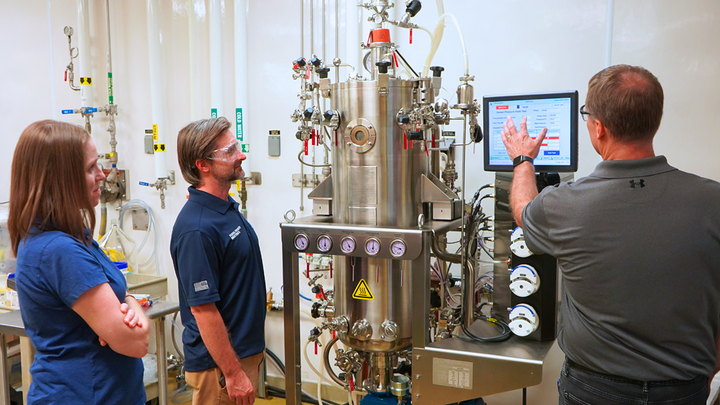Four high-impact research projects led by faculty from the College of Engineering, including one that aims to make food plastics safer for consumers, have been funded through the second Grand Challenges Catalyst Competition.
Additionally, five of the other seven funded projects include among their teams researchers from the College of Engineering.
Chancellor Rodney Bennett and Bob Wilhelm, vice chancellor for research and economic development, announced 11 new Grand Challenges projects Aug. 28. Projects include three catalyst awards and eight planning grants, for an investment of $10 million in the program’s second year. A total of $20 million has been granted so far through the four-year, $40 million initiative, a commitment by the Office of the Chancellor and the Office of Research and Innovation to strategically invest funds earmarked for research.
Among the catalyst awards is three-year, $1.36 million award to the Nebraska Engineering team led by Yusong Li, associate dean for faculty and inclusion and professor of civil and environmental engineering. The team also includes Lucia Fernández-Ballester (mechanical and materials engineering) and Yongfeng Lu (electrical and computer engineering).
Its project – “Release of Micro- and Nanoplastics from Plastic Food Containers — Characterization, Risk Assessment, Socioeconomic and Health Impacts” – is derived from the research of Kazi Albab Hussain, a doctoral student in civil and environmental engineering, that has garnered national and international attention. The team’s study, for which Hussain is lead author, shows that plastic food containers used for food preparation, storage and handling can leak micro- and nanoplastics directly into food — with potentially harmful health effects, especially for children and vulnerable populations.
Catalyst award projects are bold and catalytic, representing significant new research, scholarly and creative activity that have potential to solve grand challenges critical to Nebraska and the world. A two-step external peer review process informed catalyst award project selection.
Six Nebraska engineering faculty - Wei Bao (electrical and computer engineering), Florin Bobaru (mechanical and materials engineering), Tami Brown-Brandl (biological systems engineering), Yufung Ge (biological systems engineering), Abdelghani Laraoui (mechanical and materials engineering), and Vinochandran Variyam (School of Computing) - are on another team receiving a catalyst award. This project, co-led by Christian Binek (physics and astronomy) and Susan Hermiller (mathematics), is titled "Quantum Approaches Addressing Global Threats."
Among the Planning Grant awards are three Nebraska Engineering faculty-led projects:
- Mohammad Ghashami, assistant professor of mechanical and materials engineering, “Quantum Solutions for Energy Challenges: A Collaborative Leap Toward Sustainability.” This team also includes two other Nebraska Engineering faculty - Abdelghani Laraoui (mechanical and materials engineering) and Arman Roohi (School of Computing).
- Mohammad Hasan, assistant professor of electrical and computer engineering, “Building Community Connections for Improved Climate Resilience and Food Security: A Tribal Non-Tribal Partnership Investigating the Role of Artificial Intelligence in Affecting Behavior Change.”
- Qiuming Yao, assistant professor of computing, “TrustGenViz: An Initiative to Advance Trust and Visualization for Generative Language Models of Biological Sequences.” This team also includes four other School of Computing researchers - Juan Cui, Hongfeng Yu, Witawas Srisa-an, and Massimiliano Pierobon.
Four other projects that include Nebraska Engineering faculty on their teams also received Planning Grants:
- Moe Alahmad (Durham School of Architectural Engineering and Construction), Jason Hawkins (civil and environmental engineering), Deepak Keshwani (biological systems engineering), Tirthankar Roy (civil and environmental engineering), and Qiuming Yao (School of Computing) on "Community Climate Resilience on the Great Plains," led by Clint Rowe (earth and atmospheric sciences).
- Greg Bashford (biological systems engineering), Nicole Iverson (biological systems engineering), Carl Nelson (mechanical and materials engineering), and Bonita Sharif (School of Computing) on "Improving Healthcare Access for Underserved Populations," led by Michelle Hughes (special education and communication disorders).
- Leen-Kiat Soh (School of Computing) on "Media Information Literacy (MIL) in the Age of Algorithms," led by Bryan Wang (advertising and public relations).
- Leen-Kiat Soh (School of Computing) and Ashok Samal (School of Computing) on "Equitable Access to Civil Justice: Uniting and Interdisciplinary Team to Develop an Open-Access Knowledge Hub," led by Ashley Votruba (psychology).




